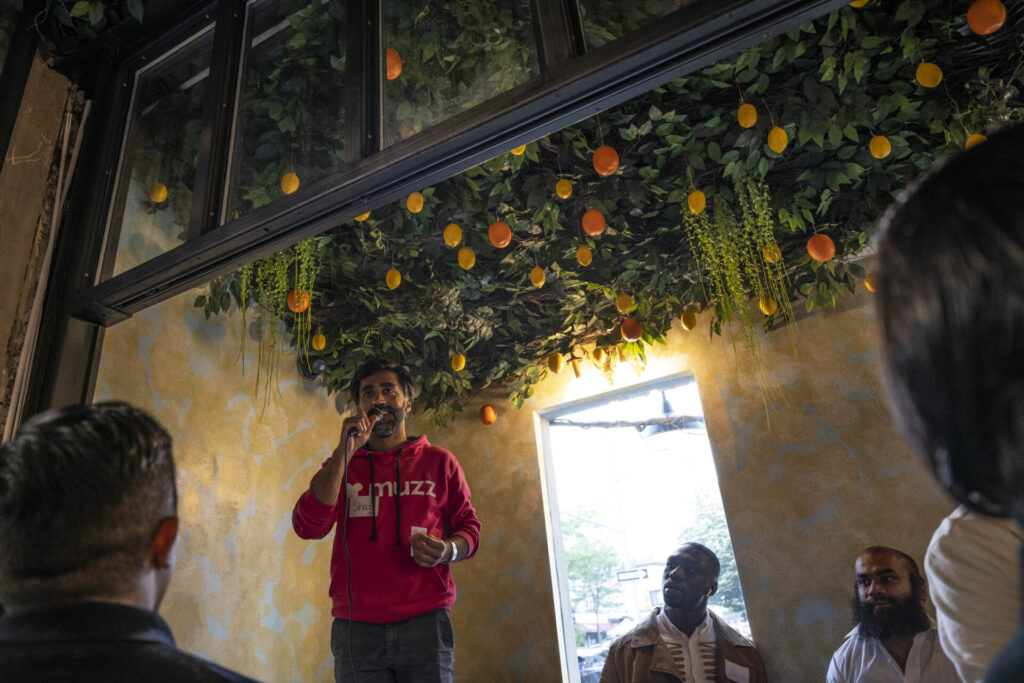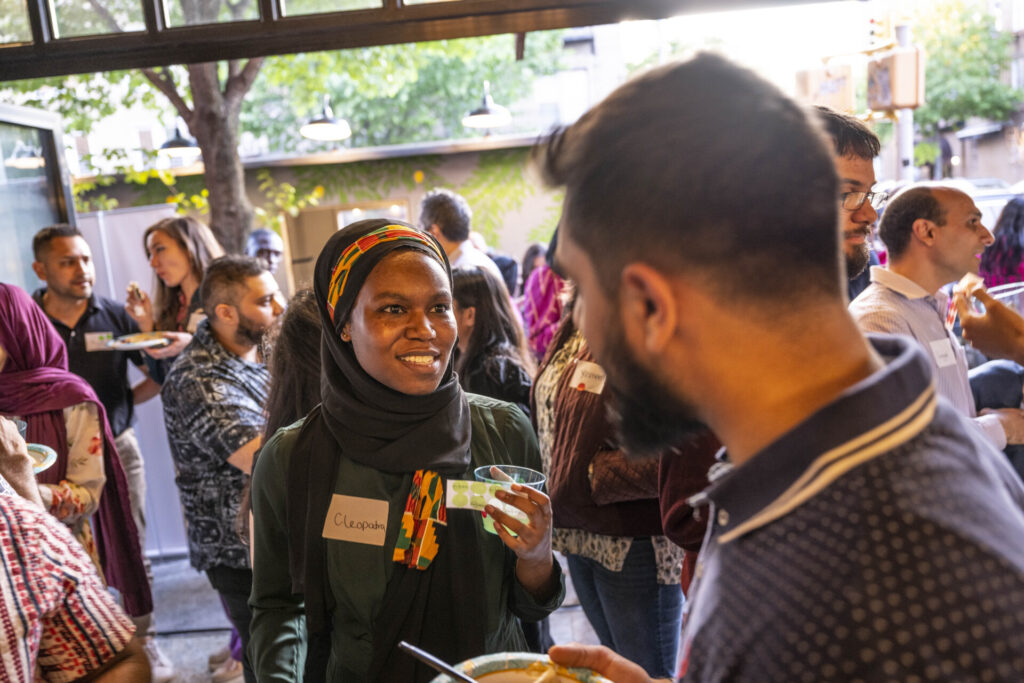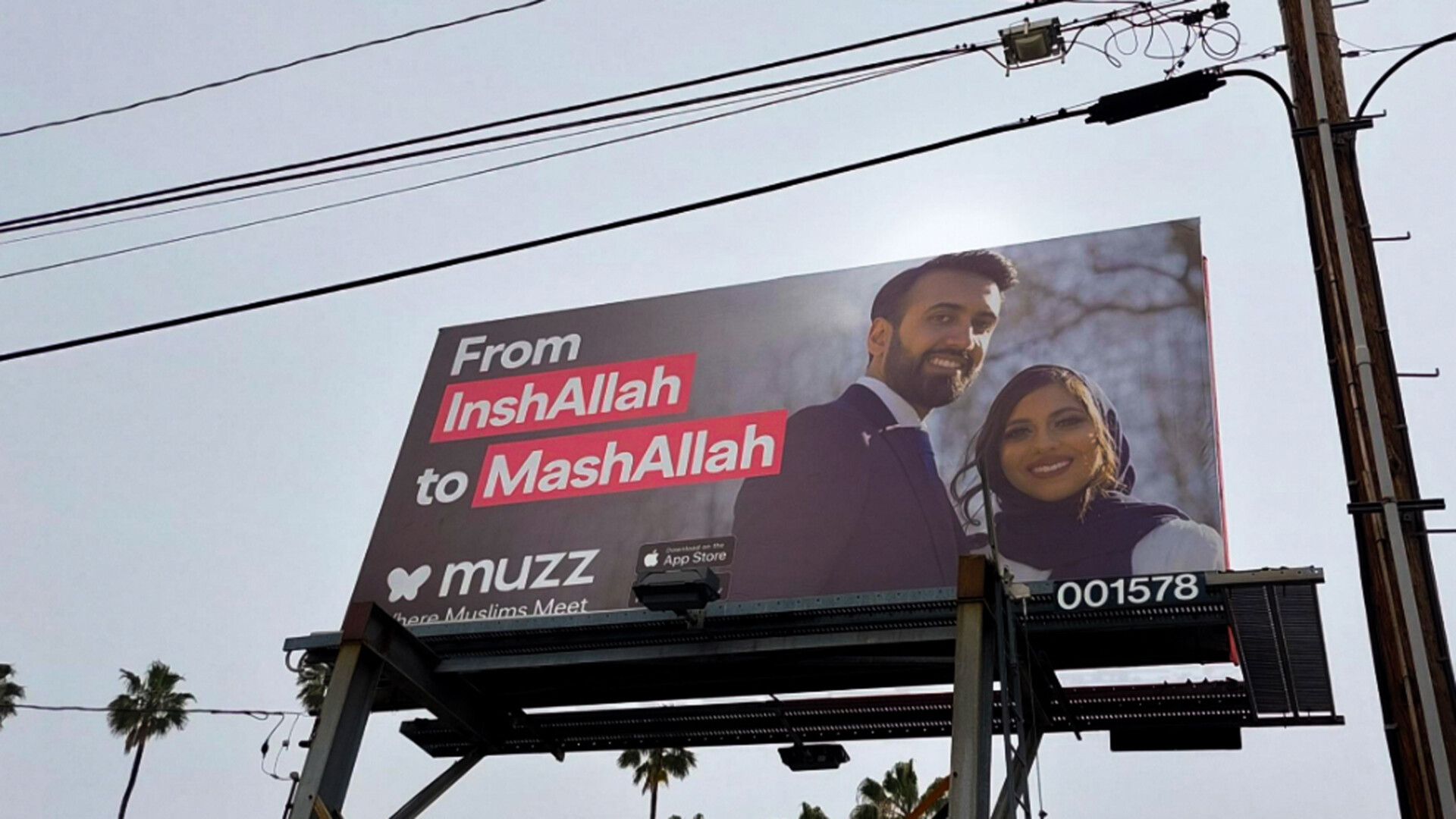Diya’s black midi-dress hugged her tall, slim figure. Her hair, black and shiny, fell straight on her back, just above her waistline. In 4-inch strappy sandals, she stood still on the sidewalk, her arms crossed, watching clusters of people, couples and in groups, chatting.
“I don’t want to be rude, but I am kind of tired of talking,” the 28-year-old New Yorker, who wanted to be identified only as Diya, said to a young man who approached her on the sidewalk.
Deflated, despite the black padded motorcycle suit he was donning on a recent spring evening, he smiled apologetically and wobbled away, avoiding pressure on his broken right foot that was in a splint (he had dropped a dumbbell on it).
The young man was not trying to pick up a stranger on a random street. They were both attending a speed-dating event for single Muslims in the Bay Ridge neighborhood of Brooklyn organized by the U.K.-based dating app Muzz and held at Fatta Mano, an Italian restaurant that was serving halal Middle Eastern food for the occasion.
He had arrived around 10 p.m., while Diya had been there for almost three hours, having arrived when the event started.
“I came straight from the hospital,” said the 28-year-old physician’s assistant, who works in urgent care in Brooklyn and gave his name as Mohammad. While others interviewed for this article shared their real names, many guests that evening, including Diya and Mohammad, asked to be identified by pseudonyms or their first names only. They cited privacy concerns; others said they were embarrassed or did not want to seem “too desperate.”
“So, it was either this or my scrubs,” he added, pointing to his motorcycle suit. He looked at the women and men standing around him, then approached a group of three people, two women and a man, and introduced himself.
The event was part of a speed-dating tour that Muzz launched in North America in May, with four stops, one in Toronto, followed by Jersey City, New York and Baltimore. Nearly all the events were sold out.
In traditional and religious Muslim communities, families looking for a bride or groom for their children have historically sought the help of “matchmakers,” be it an aunt, a family friend, a professional, or their imam, any of whom might have a Rolodex of sorts of profiles of bachelors and bachelorettes. The rituals and specifics often differ within the Muslim communities in the U.S. that include Arabs, South Asians and Southeast Asians, among others.
The rise of online dating across the world in the past two decades, however, seems to have changed the way Muslims in the U.S. meet and get married. Frustrated with the arranged marriages that their parents attempt to broker, and the restrictions their faith and tradition impose on them, as well as the pressure they feel from their families to get married at an early age, hundreds of thousands of Muslims have embraced the new technology.
“There simply are not as many avenues or opportunities for single Muslims in the U.S. to meet,” said Samia Shetia, 44, a middle school teacher from New York whose mother was a matchmaker. “And the new generations don’t want their parents to find them their husbands and wives.”
A dozen or so “halal” or “Muslim” apps operate on the internet today, including Muzz, Muslima, SingleMuslim and Salams. On Muzz, one of the leaders in this market today, there are more than 8 million subscribers worldwide, of whom around 850,000 are in the U.S., according to the company. It claims at least 400,000 success stories since its founding in 2012.

Shahzad Younas, the founder and CEO of Muzz, said during an interview that the idea behind Muzz grew out of a perceived need he personally felt as a single Muslim looking to get married in his early 20s.
His parents had tried to set him up several times, and the experience left a bitter taste. During one visit, he and his prospective match did not exchange a single word. She brought out a tray of teacups and joined her family members and Younas’. On a visit to another family, the parents of the would-be bride suggested that Younas and their daughter speak privately. When they did, the woman told him she was not interested in arranged marriages.
So, after a friend’s wedding, the idea to develop the service came to him.
“We’re kind of transforming how Muslims meet and marry,” Younas said. The key to his success, he said, is offering a platform that honors both religion and personal choice.
“I’m a practicing Muslim. My faith means a lot to me. We want to still do it in a way that respects your faith, respects your culture, your traditions, your family, all of that [is] so important.”
Beyond the reasons why people seek lifelong companionships, Muslims believe that marriage is one the keystone goals of their faith. A quote attributed to the Prophet Muhammad, in which he said, “When a man has married, he has completed one half of his religion,” is often repeated in Muslim communities.
For many single Muslims, the technology is a welcome change from traditional family-sponsored matchmaking, giving them more freedom and control over who they meet and choose to spend their lives with. They say that these platforms have put the power in their hands in countries where they are minorities.
“Think of it like your digital matchmaking auntie on steroids,” Adeem Younis, CEO and founder of the U.K.-based matrimonial service Singlemuslim.com, said of his website during an interview. “It truly combines modern-day technological convenience with the necessities that Muslims have to consider when finding love.”
Younis said family-orchestrated matches don’t really work for third- and fourth-generation Muslims because their lives in the West are simply very different from that of their parents and grandparents.
Younis created the website when he was just 18 and an undergraduate, to avoid marrying a relative his mother had chosen for him, who lived in his native Pakistan.
Like Muzz, SingleMuslim also organizes what it calls “halal speed-dating events” in the U.K., where guests are encouraged to bring chaperones. Younis said they have plans to hold similar events in the near future in the U.S., which is their biggest foreign market.
Another app, Eshq, which means love in Farsi and Arabic, was founded in 2016 by Mariam Bahawdory, a first-generation American-Afghani. She modeled her app after Bumble, where women make the first move, to empower them to take control of their narrative, she says on her website.
Among its features, Eshq can offer feedback on profiles, suggest places to meet and provide women with a safe space to make the arrangements they want, the website says.
Most of these websites say that they are not about online dating that could lead to casual hook-ups but that instead their goal is to help their clients find a life partner. Many include filters that let subscribers state exactly how soon they are looking to tie the knot.
These websites also differ from the mainstream with a filter a user can apply that allows the presence in their online interactions of a chaperone, who can be a family member or a friend.
Both founders said that their research showed that many of their users want their families involved in their online search. “We’ve never seen Singlemuslim.com as a replacement for familial engagement, but it actually allows families and support networks to easily play an active role in their loved ones’ marriage search from the comfort of their own home,” Younis said.

In a 2012 anthology titled “Love Inshallah: The Secret Love Life of American Muslim Women,” 25 Muslim-American authors wrote candidly about their search for love, from online apps and singles’ events to arranged marriages.
Several women wrote about how the internet allowed them to both widen and narrow their search: It eliminated distance and connected them with people who met their criteria.
In her “Love Inshallah” anthology essay, titled “A Cairene Kind of Love,” Molly Elian Carlson, a convert, wrote on her MySpace page: “Looking for a Spanish-speaking Muslim to marry — must not be divorced or already have a wife.” It worked, but he was across the world in Egypt. Months after talking online, she flew to Cairo to meet him in person and soon after married.
Another, Lena Hassan, explained in her essay “Cyber Love” how the internet helped her come out of her shell.
“The Internet was magic to someone like me, shy and burdened, with crippling self-consciousness,” she wrote. “In this world divided by barriers and buffers, I opened myself to people and they opened themselves to me.” (She met her husband in a chat room for Arabic speakers.)
Back in Brooklyn, women received a sheet of eight green stickers, while men were given eight red ones.
“Stickers help break the ice,” Younas told the 300 hopefuls, as he stood on a stool to welcome them. “Everyone here is looking to get married, inshallah (God willing).” They were to exchange stickers after a conversation, he said. By the end of the evening, women would have eight red ones and men eight green ones.
A 28-year-old pharmacist from Brooklyn named Mohammad Abu Zaid had eight green ones two hours into the event.
“I will look for them and ask for their numbers at the end,” he said, referring to the women he met. Would they still be here? He did not seem too concerned with that.
After all, “whatever your ‘naseeb’ is, will be,” Abu Zaid said, shrugging his shoulders. Naseeb, Arabic for destiny or fate, is what Arabs often use to describe someone’s prospects in matrimony or life.
As popular as these apps and events have become, many still prefer the traditional approaches to matrimony. Imams keep lists of single men and women, and the type of spouses they are looking for, and play matchmakers to people in their mosques.
Many Islamic nonprofit organizations provide, among their programs, matrimonial services that include publishing ads for people looking to get married and speed-dating events.
The Islamic Circle of North America (ICNA) is one such group. It held a speed-dating event during its annual conference in Baltimore, where it is based, on the same weekend as Muzz held its. Many Muslim singles attended both events.
But ICNA’s events, like others organized by Muslim organizations operating across the U.S, are more structured.
In some, participants are required to mail their profiles with a photo ahead of time. Men are asked to introduce themselves in one minute and women are required to speak to event coordinators about the candidates they are interested in to facilitate a meeting. Women also often must be accompanied by a chaperone, and all candidates are required to observe strict Islamic dress code. At other such events, parents sometimes interview prospective husbands or even attend alone, acting as a proxy for their daughters.
In Brooklyn, most of the guests interviewed said their parents encouraged them to come.
Marva Awan, 26, and Asra Mazhar, 25, two friends from New Jersey, attended with their parents’ blessings. They arrived at the restaurant early and headed straight to the bathroom to perform “al-woudou” (ablutions), their prayer rugs in plastic bags clutched tightly between their fingers.
“I am nervous,” Awan said while she waited for her friend. She had made the decision to join dating apps after her parents’ failed attempt at matchmaking.
“It was horrible; I hated it,” she said of that one time. This was her second speed-dating event, and while she said the first was “awkward,” she sat through it and was not deterred. “I will make the effort and talk to people, and I will keep coming until I find the one.”
Diya wasn’t as hopeful.
“Are you guys having any luck?” she asked my colleague and me, a few minutes after rejecting Mohammad, the physician’s assistant in the motorcycle suit. We were sitting on the edge of a large sidewalk planter and had witnessed her interaction with Mohammad.
“They all want to know what I do after work,” she said. “Who cares? How does that help you get to know me better?” She sighed, clearly frustrated.
When I explained that my colleague and I were there to write about online and speed dating in the Muslim community, she asked me whether I could help introduce her to someone she might like.
All evening, men and women had been coming up to me asking me to make an introduction to somebody they had been eyeing but were too shy to approach on their own. I would politely direct them toward the organizers and encourage them to get their help. Younas had told them during his welcoming remarks that his team was there to chaperone and make introductions when needed.
I am not sure what it was about me that said matchmaker. I was not dressed in the hot pink T-shirts or sweatshirts the organizers had on. I did not look like a guest, with a notebook and pen in one hand and a phone to record interviews in the other. I suppose that some, especially those attending a speed-dating event for the first time, were feeling self-conscious, while others were frustrated with the process and wanted help and support from anyone they could find.
I acquiesced: It was late, and I was tired. I told Diya to follow me. She did and we headed to find Abu Zaid. They were the same age, both attractive, tall and well groomed. Beyond that, I knew nothing about them. After I introduced them, I watched them for a few minutes from a close distance. It was too loud to hear the conversation, but I could see they were smiling and their body language relaxed. On my way home, I contemplated a career in matchmaking, until I remembered that Abu Zaid might have asked Diya what she likes to do after work, potentially making her swear off speed-dating events, if not marriage all together, and my new career would be over before it started.
This story was produced with support from the Round Earth Media program of the International Women’s Media Foundation.
“Spotlight” is a newsletter about underreported cultural trends and news from around the world, emailed to subscribers twice a week. Sign up here.



